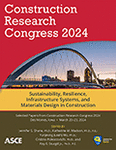Developing a Conceptual Life-Cycle Framework for Advancing Equity in Local Capital Improvement Planning
Publication: Construction Research Congress 2024
ABSTRACT
The quality of life and societal outcomes, such as health, education, employment, and wealth, depend on infrastructure, but not all communities benefit equally from infrastructure developments. Some communities experience disadvantages like limited transportation access, unmet infrastructure needs, or outdated electrical distribution infrastructure. Public agencies at different levels have made efforts to advance equity, but approaches to equity-based policies vary within the United States and between agencies. Peer-to-peer learning is one of the most effective ways to identify promising strategies for achieving infrastructure fairness. However, little research has focused on how local agencies incorporate equity into their planning processes. This study conducted a content analysis of local capital improvement plans to propose a conceptual life-cycle framework for incorporating equity into the capital planning process. The framework covers various stages, from formulating a capital budget request to evaluating the project’s effectiveness in improving equity if the request is accepted and implemented.
Get full access to this article
View all available purchase options and get full access to this chapter.
REFERENCES
ASCE. (2021). A comprehensive assessment of America’s infrastructure. ASCE.
Baltimore DoP. (2021). Baltimore City Capital Improvement Program FY2023-2028 Evaluation Criteria & Scoring Guide.
Barajas, J. M., Natekal, A., and Abrams, C. (2022). An Assessment of how State and Regional Transportation Agencies Advance Equity in Transportation Plans, Processes, and Implementation.
City of Menlo Park. (2023). “City of Menlo Park: Five-Year Capital Improvement Plan, FY2022-23.” <https://stories.opengov.com/menlopark/published/08Ka1iMS8>.
Desalegn, A., and Solomon, N. (2022). “Impacts of decision-making process on social justice in the infrastructure equity in Ethiopia.” International Review of Administrative Sciences, 00208523221093961.
Elmer, V. (2005). Capital improvement plans and budgets. University of California at Berkeley.
Fan, Y., Guthrie, A., Van Dort, L., and Baas, G. (2019). Advancing Transportation Equity: Research and Practice.
Karner, A. (2016). “Planning for transportation equity in small regions: Towards meaningful performance assessment.” Transport Policy, 52, 46–54.
Karner, A., and Levine, K. (2021). “Equity-Advancing Practices at Public Transit Agencies in the United States.” Transportation Research Record, 2675(10), 1431–1441.
Krapp, A., Barajas, J. M., and Wennink, A. (2021). “Equity-Oriented Criteria for Project Prioritization in Regional Transportation Planning.” Transportation Research Record: Journal of the Transportation Research Board, 2675(9), 182–195.
Krumholz, N. (2013). “Chapter 6 Toward an Equity-Oriented Planning Practice in the United States.” Policy, Planning, and People: Promoting Justice in Urban Development.
Laskey, A. B., Stanley, E., Islam, K., Schwetschenau, S., Sobeck, J., Smith, R. J., McElmurry, S. P., Kilgore, P., Taylor, K., and Seeger, M. W. (2023). “Perspectives and Propositions on Resilience as Interdisciplinary, Multilevel, and Interdependent.” Natural Hazards Review, 24(3), 03123004.
Lee, R. J., Sener, I. N., and Jones, S. N. (2017). “Understanding the role of equity in active transportation planning in the United States.” Transport reviews, 37(2), 211–226.
Lucy, W. (2019). “Capital Improvements and Equity.” Planning and Community Equity, Routledge, 187–195.
Minneapolis. (2021). The CLIC Report: A Summary of Recommendations for the City of Minneapolis.
Mueller, J. T., and Gasteyer, S. (2023). “The ethnically and racially uneven role of water infrastructure spending in rural economic development.” Nature Water, 1(1), 74–82.
National Academies of Sciences, E., and Medicine. (2022). Equitable and Resilient Infrastructure Investments, The National Academies Press, Washington, DC.
Nicoletti, L., Sirenko, M., and Verma, T. (2023). “Disadvantaged communities have lower access to urban infrastructure.” Environment and Planning B: Urban Analytics and City Science, 50(3), 831–849.
NYC DOT. (2023). NYC DOT - Street and Roadway Construction.
NYC Planning. (2023). Statements of Community District Needs and Community Board Budget Requests.
NYCCS. (2020). Planning Together: A New Comprehensive Planning Framework for New York City.
NYSC. (2019). “Strengthening New York’s Infrastructure: Spending Trends and Planning Challenges, August 2019.” <C:\Users\muhammad.moriyani\Zotero\storage\JSG9BJ5M\Strengthening New York’s Infrastructure Spending.pdf>.
Oakland. (2021). FY 2021-23 Adopted Capital Improvement Program.
Parker, E., Tach, L., and Robertson, C. (2022). “Do Federal Place-Based Policies Improve Economic Opportunity in Rural Communities?” RSF: The Russell Sage Foundation Journal of the Social Sciences, 8(4), 125–154.
Saint Paul. (2022). Rebuilding for Our Future: Revitalization and Sustainability for All of Us.
San Diego. (2013). Prioritizing Capital Improvement Program Projects.
Seattle. (2023). Community Involvement Commission - Neighborhoods | seattle.gov.
South Portland. (n.d.). Capital Improvement Plan Project Evaluation Guidelines.
Transportation Research Board. (2022). Systematic Approach for Determining Construction Contract Time: A Guidebook, The National Academies Press, Washington, DC.
Twaddell, H., and Zgoda, B. (2020). Equity Analysis in Regional Transportation Planning Processes, Volume 1: Guide.
White House. (2021). “Fact Sheet: The Bipartisan Infrastructure Deal.”.
Zhu, Z., Ren, J., and Liu, X. (2019). “Green infrastructure provision for environmental justice: Application of the equity index in Guangzhou, China.” Urban Forestry & Urban Greening, 46, 126443.
Information & Authors
Information
Published In
History
Published online: Mar 18, 2024
Authors
Metrics & Citations
Metrics
Citations
Download citation
If you have the appropriate software installed, you can download article citation data to the citation manager of your choice. Simply select your manager software from the list below and click Download.
